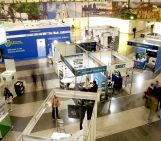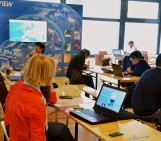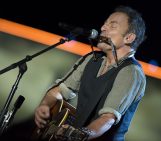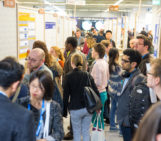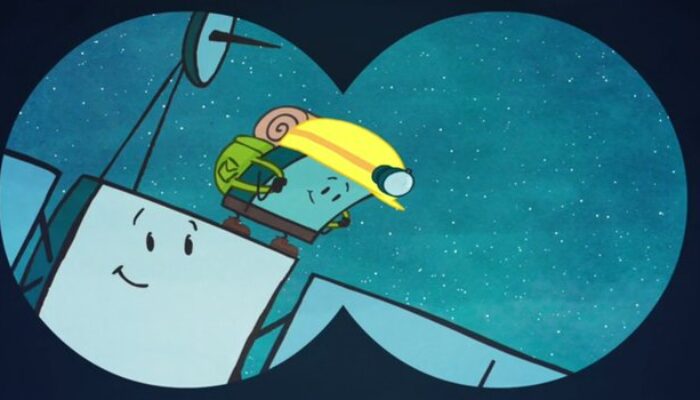
We’re halfway through the General Assembly already! Once again there is lots on offer at EGU 2016 and this is just a taster – be sure to complement this information with EGU Today, the daily newsletter of the General Assembly, available both in paper and for download here.
The day kicks off with the second of our Great Debates. Head to room K1 from 08:30 to 10:00 to share your thoughts on whether global economic growth is compatible with habitable climate. Themes of energy consumption, decarbonisation and global economic growth provide the backdrop for this Great Debate (GDB4: 08:30 – 10:100 / Room K1). You can follow the discussion on Twitter with #EGU16GDB, and, if you’re not attending, tune in with the conference live stream.
The educational and outreach symposia (EOS) feature sessions on geoscience education, science communication, public engagement and related topics. This year there are a large number of EOS sessions on offer. Today’s highlight has to be a talk by Matt Taylor, Project Scientists for the European Space Agency’s Rosetta Mission. The talk forms part of the GIFT workshop and will focus on the space mission to coment 67P/Churyumov – Gerasimenko. To attend the talk, head to room B, it starts at 10:30. Make sure to check the EOS programme to see if anything else catches your fancy.
Also taking place this morning is the Union-session on the interplays between the solid Earth and the hydrosphere, atmosphere and biosphere (US1: 08:30 – 12:00/ Room E1). Presentations in the session will focus on the multidisciplinary approaches that aim at quantify the biotic and tectonic responses to tectonics.
Another promising event set for today is the EGU Award Ceremony, where the achievements of many outstanding scientists will be recognised in an excellent evening event from 17:30–19:00 in Room E1. Here are some of the lectures being given by these award-winning scientists:
- Marine data management: from early explorers to e-infrastructures (ML17: Ian McHarg Medal Lecture by Helen Glaves, 08:30–09:30 / Room L1)
- Jets and macroturbulent “cascades” in atmospheres, oceans and the laboratory (ML21: Lewis Fry Richardson Medal Lecture by Peter L. Read, 10:30–11:30 / Room L6)
- Early 21st-Century Mass loss of the North-Atlantic Glaciers and Ice Caps (ML5: Arne Richter Award for Outstanding Young Scientists Lecture by Bert Wouters, 12:00 – 12:30 / Room L7)
The EGU Early Career Scientists’ Forum (12:15–13:15 in L7) is the best place to find out more about the Union and how to get involved. Because the EGU is a bottom up organisation, we are keen to hear your suggestions on how to make ECS related activities even better. There will be plenty of opportunities during the Forum for you to provide feedback. It’s over lunch, so you’ll find a buffet of sandwiches and soft drinks when you arrive too!
Now on to short courses! Today offers the opportunity to learn some tips for teaching in the field of hydrology (SC31/HS11.43: 08:30 – 12:00 /Room -2.85). Wanting to learn more about open access publishing but unsure where to start? Then the workshop on the ins and outs of open access publishing is just the ticket (SC3: 13:30-15:00 / Room -2.85). Maybe you thinking your research might be interesting to the media and wider public. Come along to the short course on pitching your research to a journalist or editor, to find out what steps to follow to make your science hit the headlines (SC45: 15:30 -17:00 / Room -2.61)! In the afternoon, the Cryosphere Division is hosting a climate workshop for early career scientists, (SC48: 17:30 – 19:00 / Room 0.31).
And check out some of today’s stimulating scientific sessions:
- Intrasalt structure and composition: What do we know, what might we want to know and why might it be important? (TS2.4/ERE1 , PICO Spot 2, 10:30–12:00)
- Fault rocks in the lab and in the field: structural constraints on fault growth and mechanics (TS1.2/EMRP4.15: Orals: 13:30–17:00 / Room G2; posters: 17:30–19:00 / Hall X2)
- Science and Technology for the Asteroid Impact & Deflection Assessment (AIDA) mission (PS1.5: Orals / 15:30–17:15 / Room K2; Posters: 17:30–19:00 / Hall X4)
Finally, remember to take the opportunity to meet your division’s representatives in the day’s Meet EGU sessions and, if you’ve had enough of the formalities, head on over to GeoCinema, where you’ll find some great Earth science films, including the finalists of EGU’s Communicate Your Science Video Competition. Make sure to vote on your favourite entries by ‘liking’ the videos on the EGU YouTube channel.
Have an excellent day!


